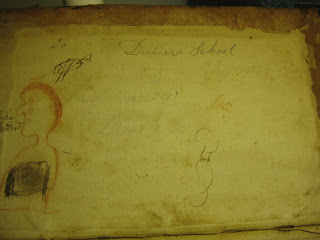This week, our archivist Laurie DiModica has been busy with the inventory of antique books housed in The Governor’s Academy Archives. She made a singular discovery and shared the following with us:
“There are approximately 300 books, with the oldest dating to the 17th century. Many of the books—their handcrafted bindings and leather covers worn but resilient—can be traced to their use during the earliest years of the academy, when Headmaster Samuel Moody educated hundreds of boys during his 27-year tenure (1763-1790). So many of these boys went on to lead notable lives in government, military, business, and the ministry. It is possible to identify several of the antique books as belongings of specific students; inscribed with the handwritten “Dummer’s School,” the oldest of the books also list their owner’s name and date of ownership. Some of the books were handed down from student to student, traceable through chronological order.
While the signatures begin to personalize these items, a few books reveal a bit more. In R. Brookes’ The General Gazetteer: Or, Compendius Geographical Dictionary, a 1762 publication that was shared by William Williams of Salem and Samuel Moody of Newbury (students of the academy ca. 1783-1785,) one can see, tucked on the inside front cover and initial page, an example of 18th century student doodling.
“There are approximately 300 books, with the oldest dating to the 17th century. Many of the books—their handcrafted bindings and leather covers worn but resilient—can be traced to their use during the earliest years of the academy, when Headmaster Samuel Moody educated hundreds of boys during his 27-year tenure (1763-1790). So many of these boys went on to lead notable lives in government, military, business, and the ministry. It is possible to identify several of the antique books as belongings of specific students; inscribed with the handwritten “Dummer’s School,” the oldest of the books also list their owner’s name and date of ownership. Some of the books were handed down from student to student, traceable through chronological order.
While the signatures begin to personalize these items, a few books reveal a bit more. In R. Brookes’ The General Gazetteer: Or, Compendius Geographical Dictionary, a 1762 publication that was shared by William Williams of Salem and Samuel Moody of Newbury (students of the academy ca. 1783-1785,) one can see, tucked on the inside front cover and initial page, an example of 18th century student doodling.

In the photograph below, doodles from the inside cover of The General Gazetteer can be seen, including an outline of two male figures, one much more detailed than the other, and labeled with “John Stoddard”. The page is ripped just next to this text, but it is likely that it read “Wanton” to reflect the name of another Dummer School student, John Wanton Stoddard of Newport, RI. Stoddard attended the academy during Headmaster Samuel Moody’s tenure. Is the Stoddard’s drawing of himself…or perhaps this is a caricature from a friend (Williams? Moody?).

Apparently, the contents of The General Gazetteer—descriptions of “all the empires, kingdoms, states, republics, provinces, cities, chief towns, forts, fortresses, castles, citadels, seas, harbours, bays, rivers, lakes, mountains, capes, and promontories in the known world; together with the government, policy, customs, manners, and religion of the inhabitants—was not enough to keep Dummer boys singularly focused!”
Thanks, Laurie for reminding us that students haven’t really changed over the centuries!
No comments:
Post a Comment